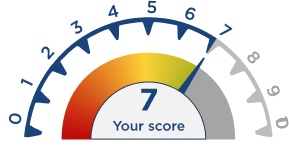How Term Deposits Work
They work by allowing depositors to park their money for a fixed period, during which the funds earn interest at a predetermined rate. The range of the tenure starts at a few weeks and can go to several years. Upon maturity, the investor receives the principal amount along with the accrued interest. Premature withdrawals are allowed but may incur a penalty, which varies by bank or institution. Many investors use investment calculators to determine their returns and compare options before investing.
Key Features of a Term Deposit
Fixed Interest Rate
The interest rate for a term deposit is fixed at the time of investment. It remains unchanged throughout the tenure. It ensures that the returns are predictable.
Fixed Tenure
Term deposits come with a fixed duration, which can range from 7 days to 10 years, depending on the investor's preference.
Penalty for Early Withdrawal
Premature withdrawal of a term deposit is allowed but attracts a penalty. The penalty is usually a reduced interest rate.
Security and Stability
Term deposits are one of the safest investment options, offering guaranteed returns and protection of the principal amount.
Ideal for Conservative Investors
Due to their low-risk nature, term deposits are suitable for conservative investors preferring stability over high returns.
Flexible Interest Payment Options
Interest on term deposits can be paid monthly, quarterly, annually, or at maturity, depending on the investor’s choice.
Growth of Savings
By reinvesting the interest earned, term deposits allow investors to benefit from compounding, resulting in steady wealth growth.
Maturity and Rollover Options
At the end of the term, investors can either withdraw the amount or opt to roll over the deposit for another term.
Loan Against Term Deposit
Many banks allow individuals to avail of loans against their term deposits, providing liquidity in times of financial need.
Taxation on Interest**
Interest earned on term deposits is taxable under the investor's income tax slab. TDS (Tax Deducted at Source) is applicable if interest exceeds Rs. 40,000 in a financial year (Rs. 50,000 for senior citizens).
Deposit Limitations
The minimum and maximum deposit limits vary across financial institutions. Some banks allow term deposits starting from as low as Rs. 1,000.
Insurance Coverage
Under the Deposit Insurance and Credit Guarantee Corporation (DICGC), term deposits are insured up to Rs. 5 lakh per depositor per bank.
Types of Term Deposits
Fixed Deposit
A fixed deposit is the most common type of term deposit, where the interest rate and tenure are predetermined, ensuring guaranteed returns.
Recurring Deposit
Recurring deposits allow investors to deposit a fixed amount monthly for a predetermined tenure, earning interest on cumulative savings.
Tax Saving Term Deposits**
These deposits have a lock-in period of 5 years and allow tax benefits under Section 80C of the Income Tax Act.
Senior Citizen Term Deposits
Senior citizens enjoy higher interest rates on their term deposits, making it an ideal savings option for retirees.
Flexi Term Deposit
Flexi term deposits combine features of savings accounts and term deposits, allowing automatic transfer of surplus funds to the deposit.
Short-Term Deposit
Short-term deposits offer tenures ranging from 7 days to 12 months, suitable for immediate financial goals.
Auto Term Deposit
Surplus funds in a savings account are automatically transferred to a term deposit when a set threshold is crossed.
NRI Term Deposits
Non-resident Indians (NRIs) can invest in term deposits through NRE, NRO, or FCNR accounts, depending on their needs.
Savings Deposits
These are hybrid accounts where funds remain accessible, but they offer lower interest rates than traditional term deposits.
Cumulative and Non-Cumulative Deposits
Interest is reinvested and paid at maturity, while in non-cumulative deposits, interest is paid periodically.
Corporate Term Deposit
Companies can invest in corporate term deposits, which may offer higher interest rates than traditional deposits.
Short-Term and Long-Term Deposits
Short-term deposits focus on immediate savings, while long-term deposits cater to extended financial goals with higher returns.
Post Office Term Deposit
The Post Office Term Deposit Scheme offers competitive interest rates, backed by the government of India.
Benefits of Term Deposits
Assured Returns
Term deposits provide fixed and assured returns, irrespective of market conditions.
Predictable Earnings
The fixed interest rate ensures predictable earnings, making it easier to plan finances.
Easy to Manage
Term deposits require minimal management once the account is opened, making them hassle-free investment options.
Flexible Tenure Options
Investors can choose a tenure suiting their financial needs, from 7 days to 10 years.
Safety and Security
Term deposits are one of the safest investments, with guaranteed principal and interest returns.
Minimal Deposit Requirements
Most banks allow individuals to open term deposits with a small initial investment, making it accessible for all.
Full Principal Return
At maturity, the investor receives the full principal amount along with interest, ensuring no financial loss.
Term Deposit Interest Rates
The interest rate for term deposits varies across banks and financial institutions, depending on the tenure and market conditions. Investors can use tools such as Future Wealth Creation Calculator to compare rates and estimate returns. Senior citizens typically enjoy a higher interest rate, while special schemes may offer additional benefits for specific tenures.
Term Deposits vs. Inflation
Inflation can erode the real value of savings over time. While term deposits provide fixed returns, it’s essential to compare the interest rate with the inflation rate. If inflation is higher than the time deposit interest rate, the real return may decrease. Investors should diversify their portfolio to combat inflation while securing stable returns.
Are Term Deposits a Good Investment?
Term deposits are ideal for risk-averse investors seeking stable returns. They provide a safe investment option with guaranteed earnings, making them suitable for short-term and long-term goals. However, investors looking for higher returns may explore other investment options such as mutual funds or stocks.
Fixed Deposit vs Term Deposit
Though used interchangeably, a fixed deposit is a type of term deposit. Term deposits include both fixed deposits and recurring deposits. While fixed deposits involve a lump sum investment, recurring deposits require monthly contributions.
To better understand your returns and plan your finances, you can use a fixed deposit calculator. It helps estimate the maturity amount and interest earned, making it easier to compare different term deposit options.
How to Invest in a Term Deposit
Step-by-Step Guide
Choose a bank or financial institution.
Decide the deposit amount and tenure.
Compare interest rates and features using investment calculators.
Submit the required documents (KYC) and deposit the funds.
Monitor the deposit through online banking.
Choosing the Right Bank or Institution
When choosing where to invest, consider factors such as interest rates, tenure options, premature withdrawal penalties, and customer service.
A term deposit is a secure and low-risk financial instrument guaranteeing fixed returns over a predetermined tenure. Whether for short-term goals, retirement planning, or wealth preservation, term deposits offer safety, stability, and predictable earnings. By understanding the term deposit meaning and features, individuals can choose the best option aligning with their financial needs and goals.
FAQs
What is a term deposit account?
A term deposit account is where funds are deposited for a fixed tenure, earning a fixed interest rate.
Is term deposit the same as FD?
A fixed deposit (FD) is a type of term deposit where the investor deposits a lump sum for a specific period.
What are examples of term deposits?
Examples include fixed deposits, recurring deposits, and tax-saving deposits.
What is a 1-month term deposit?
A 1-month term deposit is a short-term investment where the funds are deposited for one month, earning interest accordingly.
How is term deposit different from a savings account?
Term deposits lock funds for a fixed tenure with higher interest, while savings accounts offer lower interest with easy withdrawals.
Are term deposits tax-free?**
Interest earned on term deposits is taxable as per the investor’s income tax slab.
Can minors open a term deposit?
Yes, minors can open a term deposit account with the help of a guardian.
What happens if I withdraw early?
Early withdrawals attract a penalty, which reduces the interest rate.
Can I take a loan against a term deposit?
Yes, many banks offer loans against term deposits, providing liquidity when needed.
** Tax exemptions are as per applicable tax laws from time to time.



























